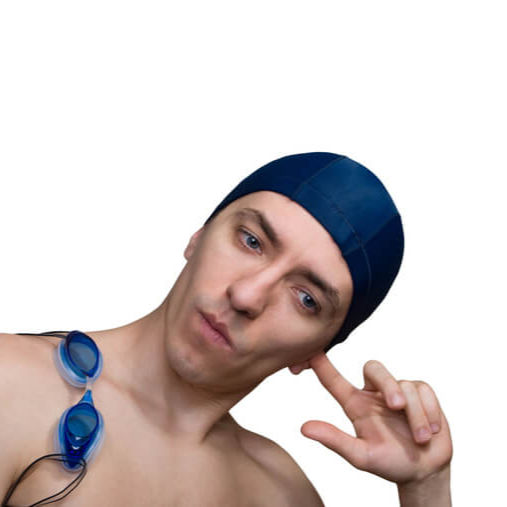Is It Ok to Leave Water in Your Ear?
- Dr. Koralla Raja Meghanadh

- Sep 22, 2025
- 4 min read

Without beating around the bush, let’s answer this question.
It is not ok to let water in your ear, but if it does ear, leave the water in your ear and let it air dry.
Let’s understand why.
Why Water Shouldn’t Enter Your Ear?
Your ear canal is a delicate environment. When water gets trapped inside your ear for a long time, it creates a moist and warm space, which is perfect for fungi and bacteria to grow. Leading to conditions like swimmer’s ear or otomycosis (fungal ear infection), causing symptoms like irritation, pain, itching, and even discharge.
If water enters your ear, it can cause irritation, prompting you to use your finger, a cotton bud, or other objects to remove it. This can easily lead to small cuts or abrasions—especially since the skin inside the ear becomes more fragile when moist—creating an entry point for infection.
What Happens if Swimming Pool Water Gets in Your Ears?
Getting water in your ear during a shower is usually harmless, but pool water in the ear is a different concern. It’s treated with chemicals like chlorine, which can irritate the delicate skin of the ear canal. People who swim frequently, especially regular swimmers, are more prone to ear problems due to prolonged exposure to this chemically treated water.
This repeated exposure can lead to a chronic infection of the ear canal known as Chronic Otitis Externa, commonly referred to as Swimmer’s Ear. This infection may be bacterial, fungal, or—in most cases—a combination of both.
Should You Try to Remove Water From Your Ear?
No, you should not try to remove water from your ear using your fingers, cotton swabs, or any other objects. While having water trapped in your ear can be uncomfortable, attempting to remove it often causes more harm than good.
The skin inside the ear canal is very delicate, much more sensitive than the skin on your hands or face. When wet, it becomes even more fragile and prone to scratches or tiny tears. Using your finger, cotton buds, or any sharp object can easily damage the ear canal lining. These minor injuries can create the perfect entry point for bacteria or fungi, leading to painful and potentially serious ear infections. If an infection is already present, trying to remove water improperly can worsen the condition, spread the infection, and delay healing.
What’s the Best Way to Get Water Out?
So, the best thing to do is actually let your ear dry naturally. Even though the trapped water feels uncomfortable and irritating, try not to clean your ear canal. Let it dry on its own.
When to See a Doctor?
Always visit a doctor for ear problems, especially if the symptoms persist for over 5 days. Any mishandling of the ear canal infection caused in case of water entering the ear can lead to perforation of eardrum, which will lead to whole set of new complications some of which could be irreversible damage to the ear.
Symptoms of Ear Infection when Water Enters the Ear
While water in the ear often causes mild irritation, certain symptoms may signal the start of an outer ear infection. If you’ve had water stuck in your ear recently, look out for the following early signs of infection:
Ear Pain – Possible Bacterial Ear Infection (Bacterial Otitis Externa)
Persistent or increasing ear pain, especially in the ear canal, is a strong indicator of a bacterial infection. While ear pain can also be a sign of middle ear infection (otitis media), pain limited to the outer canal usually points to bacterial otitis externa.
Itchy Ears – Possible Fungal Ear Infection (Otomycosis)
If your ear feels itchy rather than just irritated, it may suggest a fungal infection. Severe itchiness inside the ear canal is a common symptom of otomycosis, also known as fungal otitis externa. The sensation is often distinct and more intense than regular irritation.
Note: It is common for both ear pain and itching to occur together, as mixed infections (bacterial and fungal) are frequently seen in cases where water remains in the ear for too long.
What Not to Do When Water is in your Ear?
If you're experiencing irritation or pain due to water in your ear, it’s important to avoid certain common mistakes that can make the situation worse:
Don’t try to remove water with external objects
Avoid using cotton buds, fingers, hairpins, or any other objects to remove water from your ear. This can scratch the delicate ear canal, increasing the risk of infection.
Don’t use over-the-counter ear drops or self-medicate
Using over-the-counter antibiotic ear drops without an ENT consultation can worsen an outer ear infection, especially if it's fungal. During COVID, many patients developed perforated eardrums after self-medicating, thinking it was a minor issue.
While some recovered with treatment, many needed tympanoplasty surgery. Fungal perforations, often caused by misuse of antibiotic drops, rarely heal on their own.
Bottom line: Never use ear drops without a proper diagnosis—what seems like a small problem can quickly turn serious.
Don’t use oil or any home remedies in the ear
Oils and homemade treatments might seem harmless, but they can trap moisture, worsen irritation, or interact negatively with an existing infection caused by water in ear.
Final Thoughts
While it’s not okay to let water enter your ear canal, trying to remove it with fingers or cotton buds when it enters can do more harm than good. The best approach is to let your ear dry naturally.
So next time you feel water stuck in your ear, stay calm, give it some time, and keep your ears safe!


Comments